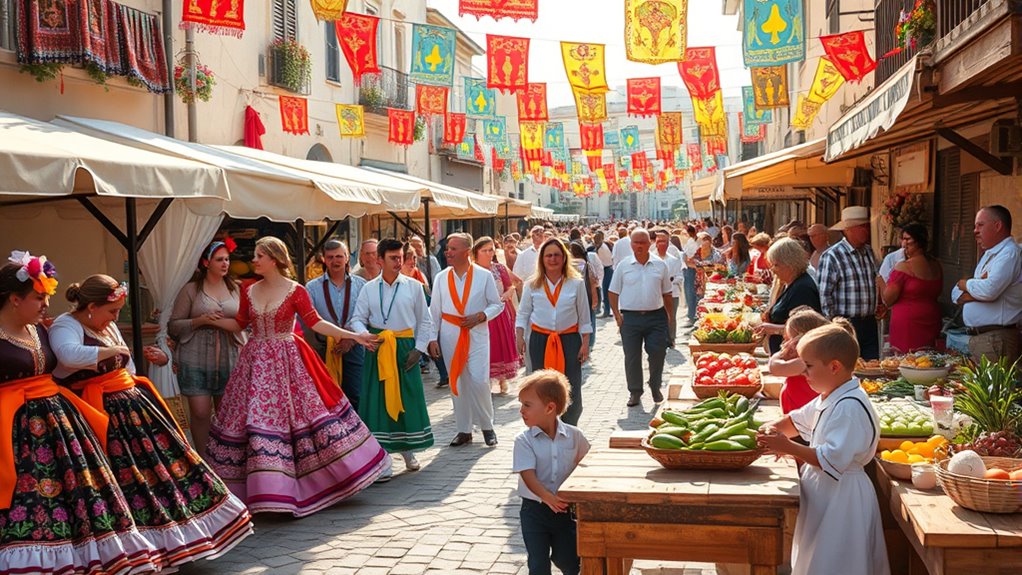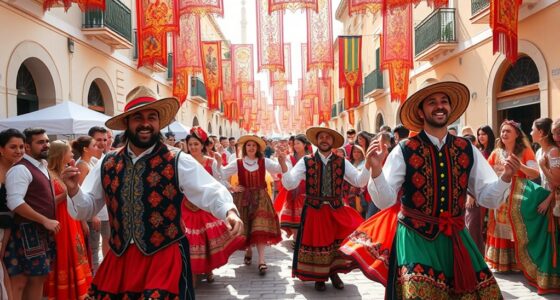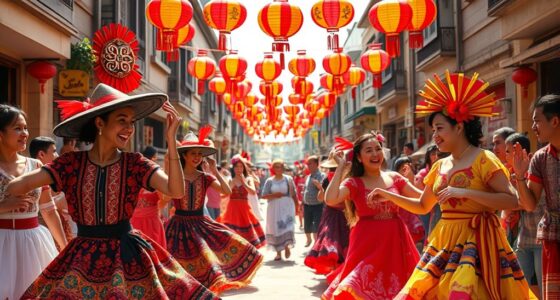To volunteer at Sardinian festivals, start by researching the event schedules and identifying roles that match your skills and interests. Contact local organizers or festival websites early to secure your spot, and be prepared to commit to specific dates and activities. Learn about local customs, language, and festival traditions to participate respectfully and enthusiastically. Planning your accommodation and transportation ahead of time will also help guarantee a smooth experience. If you stay curious, you’ll find even more ways to get involved.
Key Takeaways
- Research festival dates and identify official volunteer opportunities through festival websites, social media, or local tourism centers.
- Register early using online forms, specifying preferred dates, roles, and availability to secure assignments.
- Prepare culturally by learning about Sardinian traditions, rituals, and language basics to engage effectively.
- Ensure you meet eligibility requirements, such as age and language skills, and confirm logistical details like accommodation and transportation.
- Participate actively in festival activities like dancing, supporting artisan stalls, and respecting local customs to enrich your volunteer experience.
Understand the Types and Timing of Sardinian Festivals
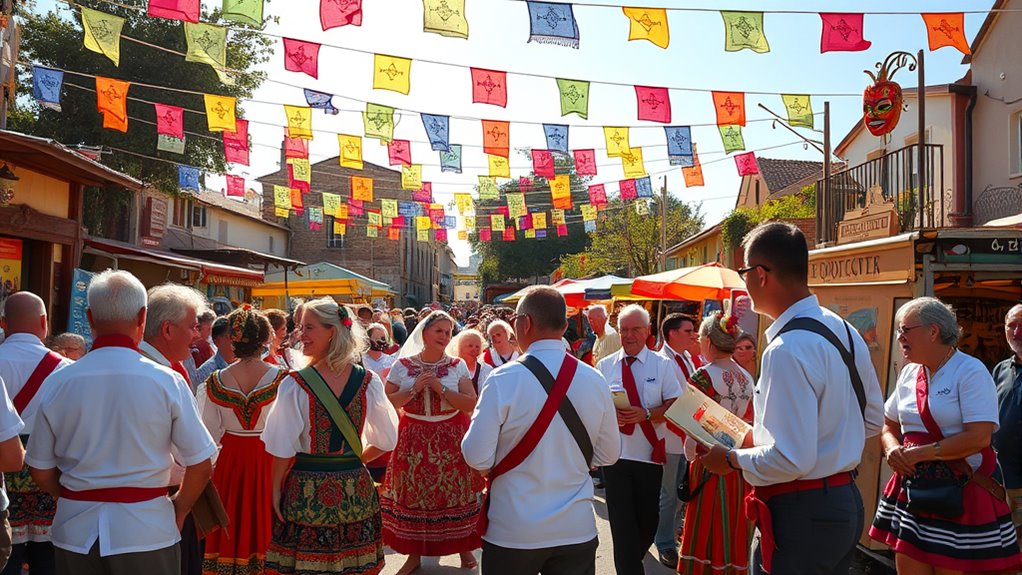
To effectively volunteer at Sardinian festivals, it’s essential to understand the different types and their timing throughout the year. Winter festivals, like Mamoiada Carnival and Sant’Antonio Abate, happen from mid-January to late February, featuring masks, fire rituals, and traditional dances. Spring’s highlight is Sant’Efisio on May 1st, a major religious procession dating back centuries. Summer hosts lively wine and food festivals, such as Calici di Stelle in Jerzu and Sagra del Redentore in Nuoro, mainly in August. The carnival season, from February to early March, includes vibrant events like Sa Sartiglia and town-specific carnivals with masked parades and horseback performances. Autumn festivals are less prominent but focus on harvest celebrations and local traditions. Festivals are often organized by local communities and religious groups, ensuring their deep roots in Sardinian culture. Knowing these timings helps you plan your volunteering efforts effectively. Additionally, understanding the local customs and traditions can enrich your experience and help you connect more meaningfully with the community.
Identify Your Areas of Interest and Skills
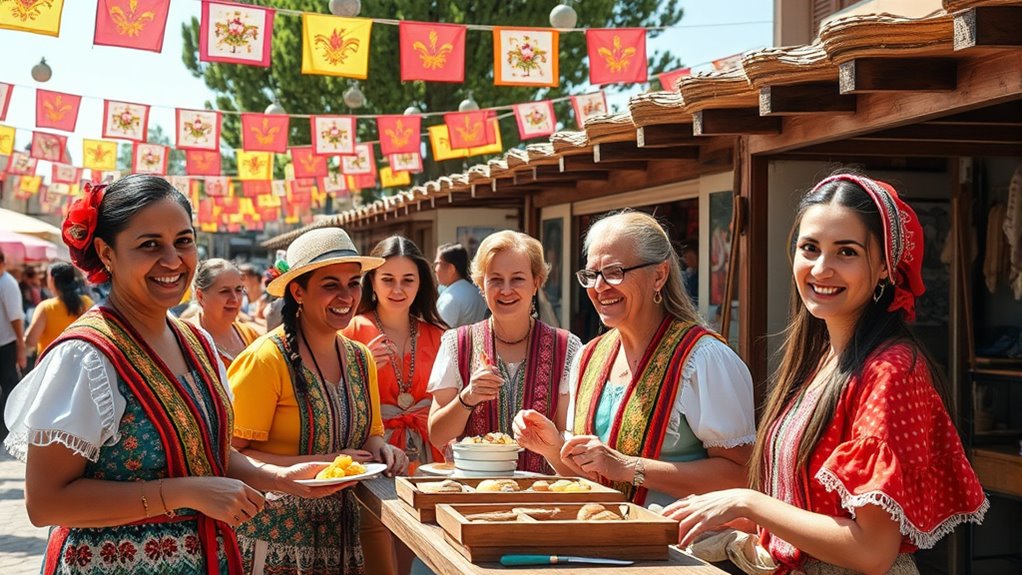
Understanding the different types and timing of Sardinian festivals helps you identify where your interests and skills can make the biggest impact. Think about what excites you—music, theater, circus arts, or youth sports—and consider how these fit into festival activities. If you’re passionate about heritage, archaeological site performances like those at Domus de Janas might suit you. Your enthusiasm for intercultural exchange or youth empowerment can guide you toward social or educational roles. Evaluate your communication, organizational, and creative skills—are you good at managing logistics, creating digital content, or supporting performances? Also, consider your language abilities and flexibility. Matching your strengths and availability with festival needs guarantees a fulfilling volunteering experience that benefits both you and the community. Additionally, exploring sound healing science or other innovative arts can offer unique opportunities to contribute creatively and promote well-being during festivals.
Research and Contact Local Festival Organizers
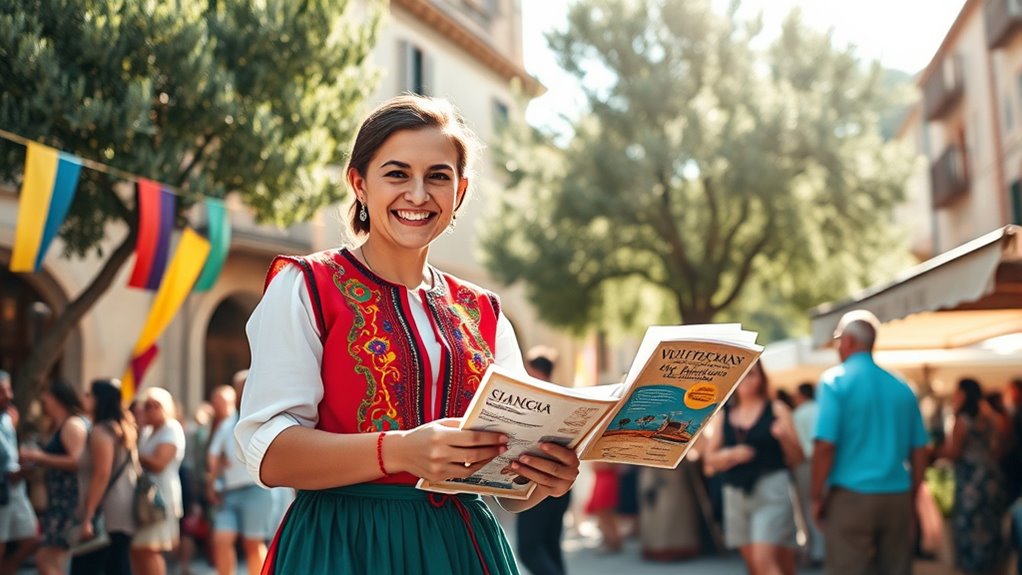
Researching and contacting local festival organizers is an essential step in your volunteering journey. Start by visiting official festival websites and online portals, which often list contact details and volunteer opportunities. Regional tourism sites and platforms like Just Sardinia or Sardinia Unlimited provide updated event calendars and organizer contacts. Social media pages on Facebook and Instagram are also valuable; they frequently post volunteer calls and allow direct messaging. Additionally, local tourist information centers serve as community hubs—they can connect you with organizers or provide brochures with contact info. Networking with cultural and community associations in the festival region can also open doors to volunteer roles. Remember to reach out well in advance, as many festivals prefer early applications and formal processes. Incorporating knowledge of testing methodologies can help you prepare for the organizational and logistical aspects of festival volunteering, ensuring you understand the importance of structured processes in event management.
Register and Commit to Specific Dates
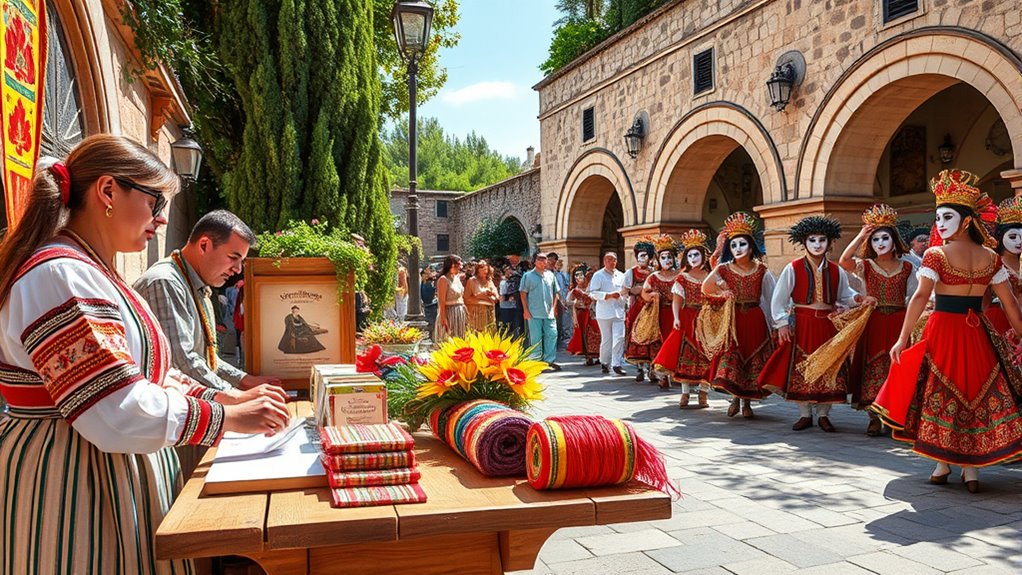
When registering, make certain to identify the festival dates you’re available for and select your shifts early. Being flexible with your schedule can help you fit into more roles and ensure you’re committed for the days you choose. Confirm your availability clearly to avoid any mix-ups as the event approaches. Utilizing a well-designed volunteer registration form can also streamline this process by allowing you to specify your preferred dates and times in advance via an online form. Paying attention to projector specifications can help ensure your role aligns with your availability and skills.
Identify Festival Dates
To effectively volunteer at Sardinian festivals, you need to identify the specific dates well in advance. Many events follow seasonal or religious calendars, with key festivals occurring annually. Use official sources like festival websites or regional portals to confirm exact dates, as they can shift slightly each year. Some major festivals include:
| Festival | Typical Month |
|---|---|
| Sa Sartiglia (Oristano) | February (variable) |
| Sagra di San Efisio (Cagliari) | Early May |
| Cavalcata Sarda (Sassari) | Mid to late May |
Planning ahead guarantees you can check volunteer registration deadlines, arrange accommodations, and align your availability with event duration. Early confirmation helps you avoid last-minute surprises. Additionally, understanding the festival traditions can enhance your volunteer experience and help you better connect with local communities.
Confirm Availability Early
Registering early and committing to specific dates guarantees you lock in a spot as a volunteer and helps organizers plan effectively. Many festivals require advance registration through online portals or email to manage volunteer numbers and roles. When you sign up, you’ll need to specify your exact available dates or shifts, which supports logistical planning and role allocation. Clear commitments prevent understaffing on key days and avoid overlaps. Late changes are often restricted or need early notification for replacements. Confirm your availability as soon as possible, especially if roles involve arriving early for training or longer commitments. Registering early also allows organizers to assign roles more efficiently, ensuring that all necessary positions are filled. Prompt communication about any schedule changes keeps the event running smoothly and shows your reliability. Early registration and firm commitments help ensure you’re part of the team on the days that matter most.
Schedule Flexibly
Opting to schedule flexibly during the registration process allows you to increase your chances of being assigned to preferred shifts and roles. By listing available dates and times honestly, you help organizers allocate tasks efficiently. Prioritizing less popular shifts boosts your chances of acceptance and ensures you’re scheduled during key festival moments. Use online forms with dropdown menus or multiple-choice options to specify your availability, including backup dates if necessary. Clear communication of your start and end times prevents conflicts, and being open to extra shifts helps cover gaps. Being aware of scheduling strategies can further improve your volunteer experience and increase your chances of getting the roles you desire.
Prepare for Cultural and Practical Requirements
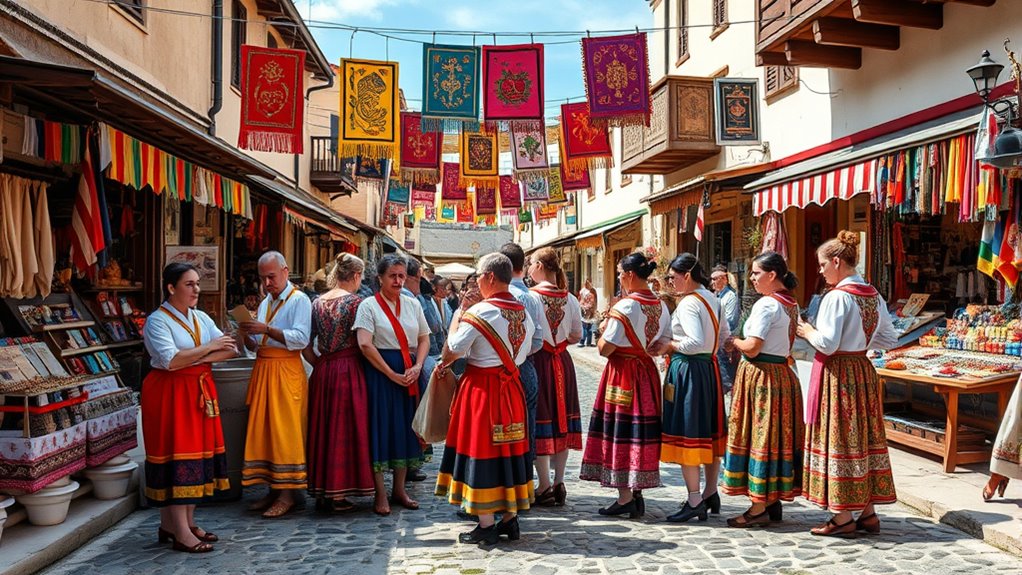
Preparing for the cultural and practical aspects of volunteering at Sardinian festivals involves understanding key requirements and expectations. Most programs favor volunteers aged 18 to 30, though exceptions exist. Proficiency in English is often necessary due to the international setting, and learning basic Italian or Sardinian terms can improve communication. You’ll usually need to commit to the entire festival, which lasts about 24 to 27 days. Accommodation, meals, and local transportation are frequently provided, sometimes with travel reimbursement available. Respect for local traditions is essential—participate in traditional processions, festivals, and community rituals with sensitivity. Be prepared for outdoor work, manual tasks, and logistical support, adapting to weather and schedule changes. Cultural awareness and a flexible attitude will help you thrive as a volunteer. Participants are also encouraged to engage actively in intercultural learning activities, which can enhance their overall experience and understanding of Sardinian culture. Developing an understanding of local customs and traditions can further enrich your volunteer experience and foster deeper connections with the community.
Acquire Necessary Skills and Knowledge
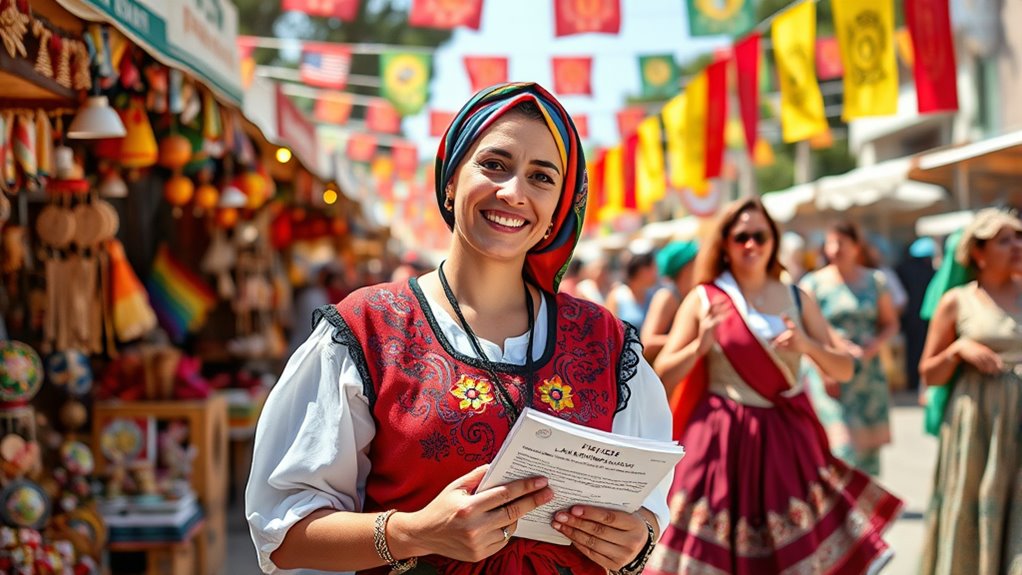
To volunteer effectively, you need to understand local traditions and customs, which helps you connect with attendees and respect cultural practices. Improving your language skills, especially in Italian, makes communication smoother and enhances your overall experience. Gaining hands-on festival experience allows you to develop essential skills and confidence to contribute meaningfully to the event. Familiarizing yourself with cultural practices, such as traditional celebrations and local etiquette, will further enrich your volunteering experience.
Learn Local Traditions
Have you ever wondered what makes Sardinian festivals so unique and meaningful? To truly connect, you need to learn the local traditions behind them. Start by understanding their religious roots, like the Feast of Saint Efisio or Saint Simplicio, and how these tie into community history. Immerse yourself in the symbolism of activities like pilgrimages, equestrian contests, and masked dances, which reflect both pagan and Christian influences. Familiarize yourself with regional costumes, their textiles, and the stories they tell. Learn traditional music, folk dances, and culinary practices to appreciate the cultural depth. Studying the origins and variations of festivals across towns will deepen your understanding. This knowledge helps you engage respectfully and meaningfully, making your volunteer experience richer and more authentic. Exploring self watering plant pots can also serve as a metaphor for nurturing cultural understanding through patience and care.
Develop Language Skills
Immersing yourself in Sardinian festivals offers a rich opportunity to develop your language skills through real-life practice. To maximize this, focus on these key areas:
- Engage with authentic language use by listening to local announcements, storytelling, and performances in Italian and regional dialects. Recognizing regional dialects is essential because they reflect Sardinia’s unique linguistic heritage and can deepen your understanding of local expressions.
- Take advantage of structured learning opportunities like guided tours, workshops, and literary festivals to expand specialized vocabulary.
- Pay attention to idioms, proverbs, and domain-specific terms used by artisans and vendors, enriching your regional speech understanding.
- Practice active communication by asking questions, giving directions, and participating in festival activities, which boosts confidence and fluency.
These experiences help you gain practical language skills while deepening your cultural connection.
Gain Festival Experience
Understanding Sardinian festival contexts and themes is essential for volunteers aiming to contribute meaningfully. You should familiarize yourself with the festival’s setting, such as archaeological sites like Domus de Janas, and grasp the cultural themes, including traditional arts, street performances, and community activities. Knowing how festivals incorporate local music, art, and cuisine enhances your ability to support activities effectively. Gaining practical event management skills, like setting up venues, assisting with rehearsals, and managing technical equipment, boosts your contribution. Developing social skills such as empathy, intercultural communication, and adaptability makes collaboration smoother. Additionally, understanding environmental practices, like waste management and sustainable event planning, helps reduce ecological impact. Building this experience ensures you’re well-prepared to support Sardinian festivals in diverse roles. Understanding local festival logistics and volunteer roles is also crucial for effective participation and ensuring the success of community celebrations.
Plan Your Accommodation and Transportation
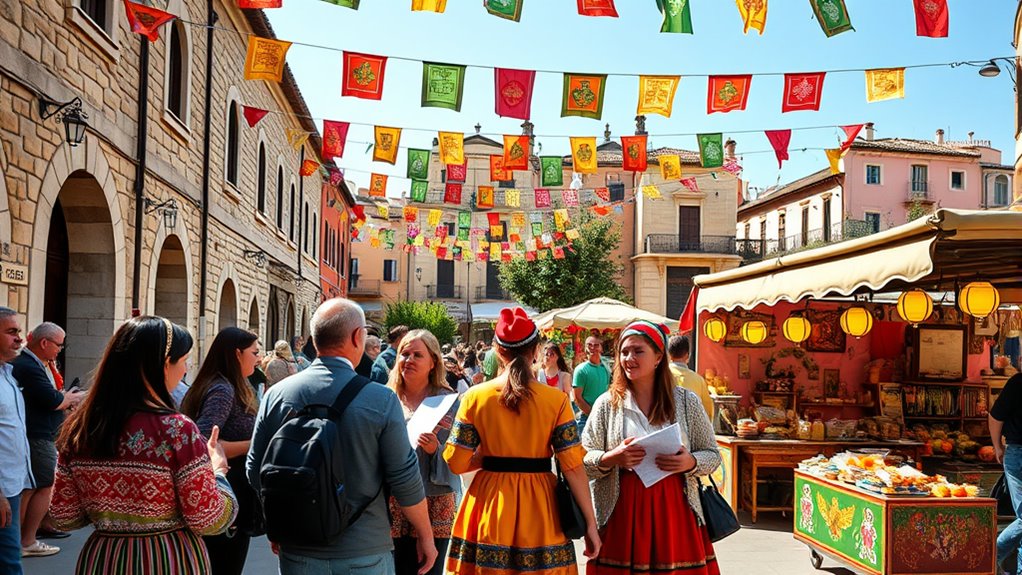
Planning your accommodation and transportation is essential to making the most of Sardinian festivals. To guarantee smooth logistics, consider these key points:
- Choose accommodations close to the festival venue to minimize transit time, especially for early or late shifts.
- Explore options like apartments or villas for groups or families, or opt for hotels in main towns like Cagliari, Alghero, or Olbia.
- If on a budget, camping near beaches such as La Cinta or Cala d’Ambra offers an affordable alternative.
- Use local tourist offices for assistance, especially if staying outside town centers, and plan transportation accordingly, considering rental cars or seasonal shuttles for better flexibility.
- Remember that some accommodations may be farther from festival venues, so planning your route in advance can save you time and stress. Accommodation options vary in proximity to festival sites, so selecting a location that suits your schedule is crucial. Proper planning guarantees you’ll arrive prepared and ready to volunteer with ease and confidence.
Participate and Engage Fully in the Festival Activities
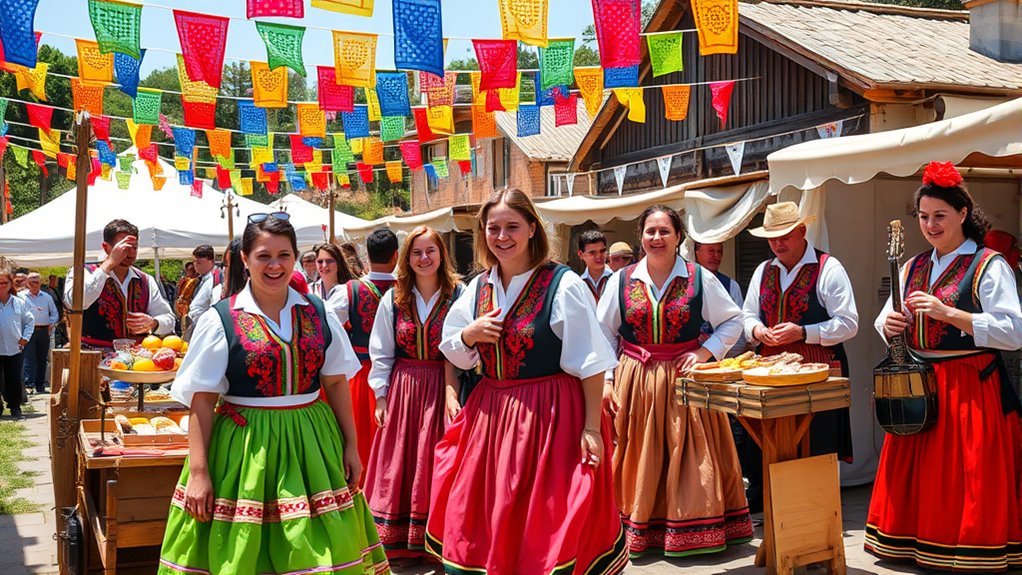
You are trained on data up to October 2023. When you participate fully in Sardinian festival activities, you deepen your cultural connection. Respect the significance of rituals, like processions carrying saint statues, and understand their spiritual meaning. Engage actively in traditional dances and music, learning local instruments or joining the rhythm to unite with the community. Observe and honor specific customs during ceremonies, such as barefoot pilgrimages or sacred offerings, ensuring your actions support the solemnity. Participating in these events also helps preserve cultural heritage and supports the continuation of Sardinian traditions. Here’s a glimpse of what you’ll experience:
| Activity | Cultural Significance | Your Role |
|---|---|---|
| Processions | Devotion, collective faith | Carry symbols respectfully |
| Traditional dancing | Community bonding, heritage preservation | Join in rhythm and movement |
| Artisan stalls | Maintain cultural crafts and cuisine | Sample, assist, promote local products |
Frequently Asked Questions
Are There Age Restrictions for Volunteering at Sardinian Festivals?
You might wonder if there are age restrictions for volunteering at Sardinian festivals. Typically, the minimum age is 18, with exceptions possible under certain conditions like parental consent or specific program approval. Younger volunteers under 18 usually need written parental permission. Keep in mind, programs often prefer volunteers aged 20-30 for long-term commitments. Be prepared to demonstrate motivation, social skills, and possibly language proficiency to participate successfully.
Do I Need to Speak Italian or Sardinian to Volunteer Effectively?
You don’t need to speak Italian or Sardinian to volunteer effectively, but knowing some basics helps you communicate better, connect more deeply, and engage more meaningfully. Speaking the languages enhances your understanding of local customs, allows clearer coordination, and fosters stronger relationships with organizers and participants. Even if your language skills are limited, your enthusiasm, cultural sensitivity, and willingness to learn can make a significant positive impact on your volunteer experience.
How Early Should I Contact Organizers to Volunteer at a Major Festival?
You should contact organizers at least 3 to 6 months before the festival to maximize your chances. Early communication guarantees you’re considered for limited spots, helps you confirm your commitment, and allows time for training or special arrangements. Keep in mind, application deadlines often close 1-2 months before the event. Reaching out early also helps you prepare regarding schedules, roles, and any specific requirements, making your volunteering experience smoother.
Are There Specific Vaccinations or Health Requirements for Volunteers?
You’ll need to meet certain health requirements to volunteer safely. Typically, you must have up-to-date vaccinations like COVID-19, MMR, varicella, and seasonal flu, especially if you’ll work closely with others. A recent TB test might also be required. Always check with the festival organizers beforehand, as they may ask for proof of immunity or recent health screenings. Staying compliant maintains you healthy and ensures your volunteer role goes smoothly.
Can I Volunteer if I Only Speak English or Other Languages?
So, you’re wondering if language barriers will stop you from volunteering? Don’t worry—English is widely used at Sardinian festivals, especially in international teams. Many roles don’t require Italian, and organizers often provide info in multiple languages. Just check with the event or platform. Your language skills won’t hold you back; your enthusiasm and willingness to contribute matter most. Sardinia welcomes multilingual volunteers enthusiastic to make a difference!
Conclusion
By boldly bridging your interests with local festivals, you’ll build bonds, boost your knowledge, and become an essential part of Sardinia’s vibrant celebrations. Embrace the enthusiasm, explore the excitement, and immerse yourself fully in the festival fun. Volunteering not only nurtures new friendships but also nourishes your soul with unforgettable experiences. So, step into the spirit, serve with sincerity, and savor the sensational synergy of Sardinian festivals!
